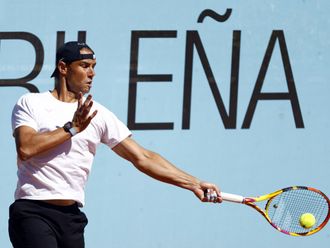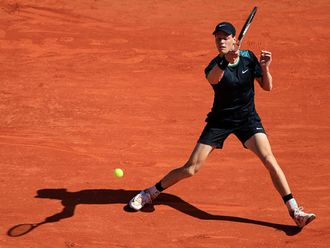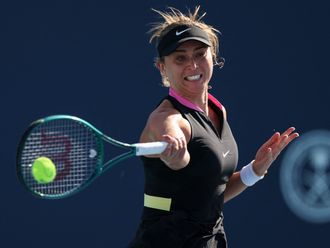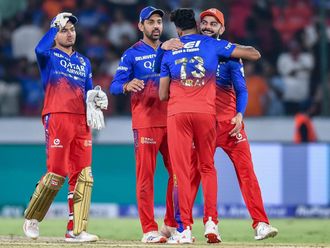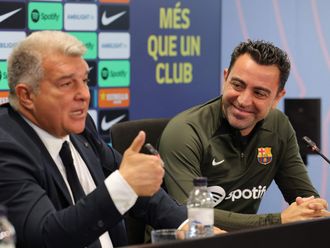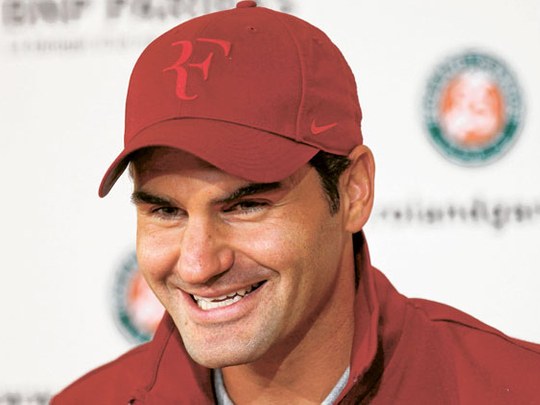
Los Angeles: Roger Federer would hate this column, because it is about Father Time, currently his toughest opponent.
His good fortune is that he won't have a lot of reading time these days, what with that little tennis event they are now holding in New York City. They call it the US Open.
Federer turned 30 on August 8. He celebrated by publicly thanking his longtime fans and supporters on his website. That was probably followed by 500 forehands, 500 backhands and twice as many practice serves.
To many of us, Father Time is getting the stiff knee working in the morning so we can walk to the sink to brush our teeth. To Federer, it is that split second that makes the backhand go wide.
For his mental well-being, Federer had to walk past his 30th birthday as if it were a crack in the sidewalk. But reality says that tennis years and dog years have similarities. That makes Federer about 200.
A 30-year-old professional tennis player has more miles on him than a ‘54 Chevy. And knees, ankles, elbows and shoulders can't be restored with an oil change.
Federer's accomplishments give us pause, tell us that, while twilight is near, there might be a couple of big sunny days left. He is accorded the label as the greatest men's tennis player ever because he won the most major tournaments.
Grand Slams are how the sport measures itself, and Federer has 16. He has five US Open titles, 66 tour titles and is one of only five people who have won all four major titles at least once, plus an Olympic gold medal. Andre Agassi, Steffi Graf and Rafael Nadal did it all in singles and Serena Williams and Federer got their Olympic gold in doubles.
Since 2003, Federer has won at least one Grand Slam tournament each year. His most recent was the 2010 Australian Open. That's six majors ago, by far his longest drought. He hasn't fallen off the map. He remains No 3 in the world, one of the most gifted shot-makers to ever slip on a wrist band and, just last week, told reporters asking about his US Open prospects, that he was "physically perfect".
Ending Djokovic's run
Significantly, it was Federer — not some free-swinging 20-year-old hotshot feeling no pressure in an early round — who ended Novak Djokovic's amazing unbeaten run at 43 earlier this year at the French Open.
There is no question that Federer still has it.
Federer won his first major title in the 2003 Wimbledon. That was the year after Pete Sampras won his last and 14th Grand Slam at the US Open. Sampras was 31 — he turned 40 on August 12 — and his era ended there. He beat Agassi in the final and never played a tour match again.
Now, nine years and 16 Grand Slams later, the clock is ticking on the Federer era. The similarities between the two are striking. Sampras' game was fluid and instinctual. So is Federer's. Sampras' body language was the perfect arrogance needed by a world-class player: Don't even harbour the thought that you can beat me. And if you get ahead on my serve at 15-40, I will ace you twice. Count on it.
Federer reacts similarly: Break point? Let me brush a strand of hair back before I get this back to deuce.
Now, Federer is facing the same late-career challenges that Sampras did — self-recognition of steps a fraction slower and aches and pains lasting a bit longer.
Defined by titles
In the months after his 2002 US Open title, Sampras agonised about whether to go on, and in several conversations said that he could not just go and play and pocket hundreds of thousands of dollars for getting to a lot of quarter-finals. He still had to know he could win. Titles defined him. Not money.
Federer is the same, and the tennis-watching public should be grateful that he still thinks he can win. That means we get to see a little more tennis power packaged in tennis grace, a little more of the majestic movement of a one-in-a-million athlete.
The new stars are No 1 Djokovic and No 2 Nadal. Last week, Djokovic was Jay Leno's guest on NBC and Nadal was David Letterman's guest on CBS.
It was like a mini US Open final — head-to-head on competing networks. Those shows once were Federer's domain. That was during his era.



